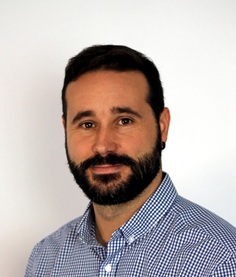
José Camacho is Full Professor in the Department of Signal Theory, Telematics and Communication and head of the Computational Data Science Laboratory (CoDaS Lab), at the University of Granada, Spain. He holds a degree in Computer Science from the University of Granada (2003) and a Ph.D. from the Technical University of Valencia (2007), both in Spain. He worked as a post-doctoral fellow at the University of Girona, granted by the Juan de la Cierva program, and was a Fulbright fellow in 2018 at Dartmouth College, USA. His research interests include networkmetrics and intelligent communication systems, computational biology, knowledge discovery in Big Data and the development of new machine learning and statistical tools.

Antonio M. Mora obtained his degree in Computer Science in 2001 from the University of Granada (Spain). In 2009, he earned his Ph.D. from the same university. Currently, he is an Associate Professor in the Department of Signal Theory, Telematics, and Communications, also at the University of Granada, where he previously worked as a contracted researcher and substitute professor for 14 years. His areas of work include bioinspired algorithms and their applications in data analysis, network security, and video games, among others. He has published more than 25 articles in indexed international journals and over 90 articles in top-level international conferences. He has an H-index of 25 on Google Scholar and 16 on Scopus. He has served as the principal investigator in three national projects, one regional project, and two projects within the University of Granada's Campus of International Excellence. He has conducted four research stays (short visits), two in Spain as an invited researcher, one at the University of Napier (Scotland), and another at the University of L'Aquila (Italy).

Profesor asociado de la UGR. Obtuvo el título de Máster en Ingeniería de Telecomunicación por la Universidad de Granada (España) en 2008 y en 2014 su doctorado: "Protección de redes P2P mediante análisis de tráfico". Este doctorado fue galardonado con un premio nacional y otro regional. Su investigación se centra en la seguridad de las redes, tanto desde el punto de vista del análisis del tráfico como de la detección y defensa frente a los ataques.

PhD in ICT by the UGR. Her thesis was focused on the detection and diagnosis of anomalies by using multivariate analysis. This research was carried out in two contexts: the monitoring of industrial processes, and security in communication networks. Nowadays, she is Cybersecurity Coordinator at Fidesol, where she leads different initiatives and research related to security and privacy based on machine learning and anomaly detection. Some of her main interests are digital transformation, SMEs, XAI, and secure and ethic AI.

David Kotz is the Provost, and the Pat and John Rosenwald Professor in the Department of Computer Science, at Dartmouth College. He previously served as Associate Dean of the Faculty for the Sciences, as a Core Director at the Center for Technology and Behavioral Health, and as the Executive Director of the Institute for Security Technology Studies. His current research involves security and privacy in smart homes, and wireless networks. He has published over 250 refereed papers, obtained \$89m in grant funding, and mentored over 100 research students and postdocs. He is an ACM Fellow, an IEEE Fellow, a 2008 Fulbright Fellow to India, a 2019 Visiting Professor at ETH Zürich, and an elected member of Phi Beta Kappa. He received his AB in Computer Science and Physics from Dartmouth in 1986, and his PhD in Computer Science from Duke University in 1991.

Rasmus Bro (born 1965) studied mathematics and analytical chemistry at the Technical University of Denmark and received his M.Sc. in 1994. In 1998 he obtained his Ph.D. in multiway analysis from the University of Amsterdam, The Netherlands. Since 1994 he has been employed at the Department of Food Science, at the University of Copenhagen, and in 2002 he was appointed full professor of chemometrics. He has had several stays abroad at research institutions in The Netherlands, Norway, France, and United States. Current research interests include chemometrics, multivariate calibration, multiway analysis, exploratory analysis, blind source separation, curve resolution, MATLAB programming.

Katarzyna Wasielewska received MSc in computer science from the Faculty of Mathematics and Computer Science, Nicolaus Copernicus University in Torun (NCU), Poland, in 1999, and PhD in telecommunications from the Faculty of Telecommunication, Information Technology and Electrical Engineering, University of Science and Technology in Bydgoszcz (UTP), Poland, in 2014. She is Assistant Professor at the Institute of Applied Informatics, State University of Applied Sciences in Elblag, Poland. Currently, she is a Postdoctoral Researcher at the Department of Signal Theory, Telematics and Communication and the CoDaS Lab, University of Granada, Spain, granted by EU Marie Skodowska-Curie Actions Individual Fellowships program. Her research interests include computer communications, network traffic analysis, network security, multivariate analysis and machine learning. She worked 10 years as an ISP network administrator, and she is an active IEEE volunteer.

Juan Fra graduated in Telecommunications Engineering, specializing in Telematics in 2021 from the University of Granada (Spain) and is currently studying the Master of Engineering also in Granada. His TFG consisted in the development of a mobile application and a server for a psychiatrist to follow up the state of his patients. His main interests are learning new programming languages and network management. He worked on the technical tasks of this project and was trained in data analysis.